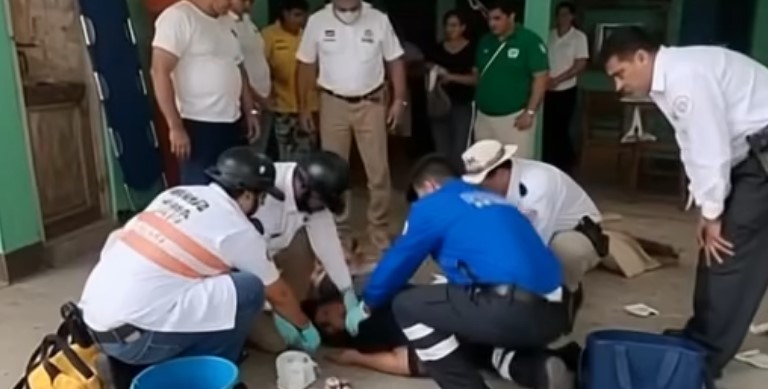The Secret That Shattered a Family: A Cautionary Story About Betrayal, Technology, and Mental Health
When a seemingly ordinary evening turns into a turning point for an entire family, the result often extends far beyond the walls of a single home. In a quiet suburban neighborhood, a young woman uncovered a secret on her partner’s phone that would forever change the course of their lives — and spark a wider conversation about trust, emotional health, and digital awareness.
This story, though deeply tragic, highlights an urgent truth: the intersection between technology, secrecy, and mental distress can create devastating outcomes if early warning signs are missed.
The Discovery That Changed Everything

Maria*, a 33-year-old woman living in a peaceful residential area, was scrolling through her husband’s phone one night when she came across messages that didn’t make sense. At first, she assumed it was a misunderstanding — a miscommunication between friends or family members. But as she looked closer, she realized the situation might be more serious.
The messages suggested a breach of trust that left her confused and heartbroken. What followed was not an act of malice, but a chain of emotional reactions triggered by shock, anger, and disbelief. What had once been a stable relationship quickly unraveled under the weight of betrayal.
(*Name changed to protect privacy.)
When Secrets Lead to Breaking Points

Relationship experts emphasize that discovering hidden messages or evidence of deception can have a profound psychological impact. According to Dr. Lale Kadir, a family therapist specializing in emotional trauma, “Betrayal hits at the foundation of identity and safety. When someone feels deceived by a partner, the brain registers it as a direct threat — not only to the relationship but to one’s sense of stability.”
While most people process betrayal through sadness or confrontation, others experience panic or uncontrollable emotional flooding. This physiological response — known as “amygdala hijack” — occurs when emotion overrides logic. It’s why professionals urge anyone in crisis to step away and seek help immediately, rather than respond impulsively.
Dr. Kadir adds: “What we often forget is that betrayal is not only about romantic relationships. It can also involve money, privacy, or moral trust. The key is learning to recognize emotional escalation before it becomes destructive.”
Understanding the Digital Dimension
Technology has made modern relationships more complex than ever. Smartphones and messaging apps offer connection — but they can also become portals of secrecy. A recent survey by CyberSafe Relationships Institute found that nearly 40% of couples have experienced conflict over phone privacy or secret online communication.
Digital anthropologist Dr. Adam Rivas notes that while curiosity about a partner’s digital life is normal, boundaries are essential: “Privacy should never equal secrecy. A healthy digital boundary allows trust to exist without surveillance.”
Experts recommend the following digital-safety practices for couples and families:
-
Mutual transparency: Discuss what’s acceptable regarding phone or social-media use.
-
Check in regularly: Open conversations about digital habits can prevent misunderstandings.
-
Recognize early warning signs: Emotional withdrawal, secrecy about devices, or late-night texting may signal deeper issues.
-
Seek mediation early: When digital conflict emerges, a therapist or counselor can help de-escalate tension before it becomes unmanageable.
The Hidden Cost of Silence

In Maria’s case, what she discovered set off a wave of panic and confusion. Friends later described her as devoted but increasingly withdrawn. She had begun to notice changes in her partner’s behavior — but out of fear of conflict, she avoided addressing them.
This avoidance, experts say, is common. “People are often afraid that confronting deception will make things worse,” says clinical psychologist Dr. Erin Zhao. “But silence allows mistrust to grow unchecked. It’s the conversation we avoid that often defines the relationship’s end.”
The tragedy that followed became a wake-up call for the community — not because of the event itself, but because of the silence leading up to it.
Communities Grapple With Questions of Prevention
After the incident, community leaders and mental-health advocates came together to discuss how early intervention could prevent similar tragedies. Many pointed to the need for mental-health first aid training, giving ordinary citizens the ability to recognize emotional distress and respond with empathy instead of judgment.
Programs now being piloted in several U.S. states include:
-
Crisis de-escalation workshops for couples and families.
-
Digital-literacy seminars teaching people to identify online red flags and emotional manipulation.
-
Confidential hotlines where individuals can seek immediate guidance when discovering distressing information about a loved one.
Emotional Health: Recognizing the Signs of Overwhelm
Psychologists warn that high emotional stress can alter behavior in dangerous ways if left untreated. Physical symptoms — trembling, chest tightness, dissociation — are not signs of weakness but signals of crisis.
According to The National Institute of Mental Health, nearly one in five adults experience a mental-health episode triggered by sudden loss or betrayal each year. Learning to identify early warning signs can prevent irreversible outcomes:
-
Persistent thoughts of hopelessness or revenge.
-
Sudden social withdrawal.
-
Fixation on a single distressing event.
-
Difficulty sleeping or concentrating.
-
Impulsive or erratic decision-making.
Experts urge that anyone noticing these symptoms — in themselves or others — contact a crisis counselor or mental-health hotline immediately. Professional guidance can turn moments of despair into opportunities for healing.
The Role of Law Enforcement and Support Networks
Police officials who handled the case later emphasized the importance of community awareness and early reporting of domestic crises. They stressed that violent acts rarely occur spontaneously; rather, they often emerge after weeks or months of emotional strain.
To address this, local authorities have partnered with NGOs to promote early-intervention networks, allowing neighbors, teachers, and family members to refer individuals showing signs of emotional instability to counseling centers.
Such measures aim not to punish, but to protect — offering safe outlets before anger or panic turns dangerous.
Building Healthier Conversations About Betrayal
In the aftermath, therapists and family advocates have used the case as an opportunity to discuss healthier ways to manage suspicion, disappointment, or digital conflict in relationships.
Some of their key recommendations include:
-
Pause before reacting. Take time to cool down and verify information before confrontation.
-
Seek professional mediation. A neutral third party can help interpret what was found and guide the conversation.
-
Focus on safety, not revenge. Emotional pain can cloud judgment; ensure all family members — especially children — are protected and calm.
-
Engage in therapy. Even short-term counseling can help individuals process betrayal constructively.
Turning Tragedy Into Awareness
The heartbreaking outcome of Maria’s story left a lasting mark on her community. In its wake, local organizations launched awareness campaigns about healthy communication, digital boundaries, and emotional-crisis response. Schools introduced new lessons about safe technology use, while community centers opened free counseling hotlines.
Although the original event ended in sorrow, it has inspired meaningful change — encouraging others to speak up, seek help, and prioritize mental health before relationships reach a breaking point.
The Larger Lesson
Every relationship carries challenges, but trust and open communication remain the strongest protections against harm. When people feel unsafe or discover something that threatens their peace of mind, the answer is not retaliation — it’s reaching out for help.
Whether through local hotlines, therapy, or online resources, support is always available:
-
National Domestic Violence Hotline (U.S.) — 1-800-799-SAFE (7233)
-
Crisis Text Line — Text HELLO to 741741
-
Mental Health America Helpline — 1-800-273-TALK (8255)
-
RAINN Sexual Abuse Hotline — 1-800-656-4673
Final Reflection
Behind every headline about domestic tragedy lies a preventable story — one that could have ended differently if someone had reached out sooner. What happened to Maria and her family is a reminder of how betrayal, secrecy, and emotional turmoil can collide when help isn’t sought in time.
The lesson is clear: trust must be built, not tested; secrets must be addressed, not buried; and emotional pain must be treated, not ignored.
By encouraging awareness, compassion, and early intervention, communities can turn tragedy into prevention — ensuring that the next time a hidden secret surfaces, it leads not to violence, but to healing.



